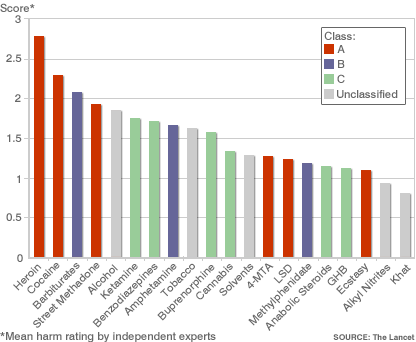UK scientists propose drug reclassification
Here's an interesting proposal from our friends across the ocean: reclassify our illegal drugs by merit of the harm and impact to and on individuals and society.
From The Academy of Medical Sciences ...
But of course, I'm a humble writer, and not a policy maker. It just makes sense to me ... If it minimizes harm, we should apply our growing knowledge-base to keeping people off the various dopes out there. If we understand them better now than when we first wrote the laws, let's update them to reflect our progress.
That's far more logical than controversial.
From The Academy of Medical Sciences ...
The drug classification system in the UK is not "fit for purpose" and should be scrapped, scientists have said. They have drawn up an alternative system which they argue more accurately reflects the harm that drugs do. The new ranking system places alcohol and tobacco in the upper half of the league table, ahead of cannabis and several Class A drugs.
The study, published in The Lancet, has been welcomed by a team reviewing drug research for the government.
The Academy of Medical Sciences group plans to put its recommendations to ministers in the autumn. A new commission is also due to undertake a three-year review of general government drug policy.
The new system has been developed by a team led by Professor David Nutt, from the University of Bristol, and Professor Colin Blakemore, chief executive of the Medical Research Council. It assesses drugs on the harm they do to the individual, to society and whether or not they induce dependence.
A panel of experts were asked to rate 20 different drugs on nine individual categories, which were combined to produce an overall estimate of harm. In order to provide familiar benchmarks, five legal drugs, including tobacco and alcohol were included in the assessment. Alcohol was rated the fifth most dangerous substance, and tobacco ninth.
Heroin was rated as the most dangerous drug, followed by cocaine and barbiturates. Ecstasy, however, rated only 18th, while cannabis was 11th. The researchers said the current ABC system was too arbitrary, and failed to give specific information about the relative risks of each drug.
It also gave too much importance to unusual reactions, which would only affect a tiny number of users. Professor Nutt said people were not deterred by scare messages, which simply served to undermine trust in warnings about the danger of drugs.I couldn't agree more. I personally feel our drug policies should sync with our highest and best understanding of the sciences of and pertaining to their use and abuse.
He said: "The current system is not fit for purpose. Let's treat people as adults. We should have a much more considered debate how we deal with dangerous drugs."
He highlighted the fact that one person a week in the UK dies from alcohol poisoning, while less than 10 deaths a year are linked to ecstasy use. Professor Blakemore said it was clear that current drugs' policies were not working.
"We face a huge problem. Illegal substances have never been more easily available, or more widely abused."
He said the beauty of the new system, unlike the current version, was that it could easily be updated to reflect new research. Professor Leslie Iversen, a member of the Academy of Medical Sciences group considering drug policy, said the new system was a "landmark paper". He said: "It is a real step towards evidence-based classification of drugs."
But of course, I'm a humble writer, and not a policy maker. It just makes sense to me ... If it minimizes harm, we should apply our growing knowledge-base to keeping people off the various dopes out there. If we understand them better now than when we first wrote the laws, let's update them to reflect our progress.
That's far more logical than controversial.
Labels: drugs
Post a Comment

